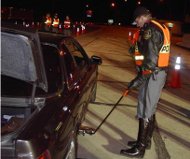Article from: www.thenewspaper.com/news/38/3816.asp
6/11/2012
Virginia Appeals Court Expands Use of Roadblocks
Court of Appeals in Virginia gives police a free hand in setting up roadblocks to search motorists not suspected of any crime.
 Police in Virginia may block off roads to search and interrogate motorists as long as a vague "plan" is filed in advance, the state Court of Appeals ruled last Tuesday. Michael Anthony Desposito challenged his May 27, 2009 arrest at a checkpoint run by the Hanover County Sheriff's Office on the ground that the department allowed its officers to run open-ended roadblocks in violation of the Fourth Amendment.
Police in Virginia may block off roads to search and interrogate motorists as long as a vague "plan" is filed in advance, the state Court of Appeals ruled last Tuesday. Michael Anthony Desposito challenged his May 27, 2009 arrest at a checkpoint run by the Hanover County Sheriff's Office on the ground that the department allowed its officers to run open-ended roadblocks in violation of the Fourth Amendment.
Though Fourth Amendment prohibits unreasonable searches and seizures, the Virginia courts presume that warrantless and suspicionless searches of motorists is acceptable as long as it is done in the name of safety. The state requires automobiles to go through an annual "safety" inspection process in which those that pass receive a sticker good for a year. Identifying automobiles that may have minor violations such as window tint that is slightly too dark or wiper blades that are a bit too old is big business for the state. According to the Virginia Auditor of Public Accounts, safety sticker tickets generated $12.5 million in 2010.
Desposito was stopped at a checkpoint meant to issue such tickets. A lieutenant in the department approved a list of locations where the roads would be blocked for "no less than thirty minutes" and that every car that passed should be stopped. That was the extent of the plan that Sergeant Drew Darby executed between 11:10am and 12:45pm. Desposito argued that giving such unbridled discretion to officers allows them to set up roadblocks intended to target individual motorists. The three-judge appellate panel disagreed.
"There were ample safeguards present in the case now before us," Judge Robert P. Frank wrote for the court. "Sergeant Darby was also required to run the checkpoint for a minimum of 30 minutes. His discretion extended only to the precise time at which he began the checkpoint and the duration of the checkpoint... Sergeant Darby was instructed precisely where and approximately when to set up the roadblock. It would have been virtually impossible for him to target anyone while working within those parameters."
The Virginia court's policies go far beyond those authorized in the 2000 US Supreme Court decision Indianapolis v. Edmond which limited the use of roadblocks to issues of life or death, rejecting use of the technique for drug checkpoints.
"We are particularly reluctant to recognize exceptions to the general rule of individualized suspicion where governmental authorities primarily pursue their general crime control ends," Justice Sandra Day O'Connor wrote. "Only with respect to a smaller class of offenses, however, is society confronted with the type of immediate, vehicle-bound threat to life and limb that the sobriety checkpoint in Sitz was designed to eliminate."
The Virginia court upheld Desposito's conviction for driving while prohibited to do so under the habitual offender statute. A copy of the decision is available in a 55k PDF file at the source link below.
Source: Desposito v. Virginia (Court of Appeals, State of Virginia, 6/5/2012)
Permanent Link for this item
Return to Front Page
 Police in Virginia may block off roads to search and interrogate motorists as long as a vague "plan" is filed in advance, the state Court of Appeals ruled last Tuesday. Michael Anthony Desposito challenged his May 27, 2009 arrest at a checkpoint run by the Hanover County Sheriff's Office on the ground that the department allowed its officers to run open-ended roadblocks in violation of the Fourth Amendment.
Police in Virginia may block off roads to search and interrogate motorists as long as a vague "plan" is filed in advance, the state Court of Appeals ruled last Tuesday. Michael Anthony Desposito challenged his May 27, 2009 arrest at a checkpoint run by the Hanover County Sheriff's Office on the ground that the department allowed its officers to run open-ended roadblocks in violation of the Fourth Amendment.